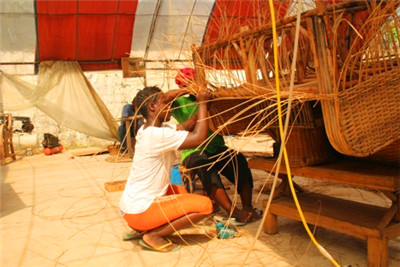| Skill Training Brightening Future of Young Liberians |
|
|
| 2018-05-31 02:06 |
|
Paynesville – Alice Kemun is ambitiously daring to change the lives of hundreds of youths and contribute to the diversification of Liberia’s economy. Six months ago, the 30-year-old initiated a plan – along with eight others -to produce furniture out of bamboo and rattan fibres. That was after she graduated from a two-year skill-training program funded by the Chinese Embassy in Monrovia.
(Kemun helps a workmate puts finishing touches and a chair at her workshop in Paynesville) Five years ago, Kemun began acquiring furniture-weaving skills at the China-Liberia bamboo and rattan weaving skill training school based in Paynesville near the Samuel Kanyon Doe Sports Complex. Later, she would realize that the technique was not just a part-time trade, but a conduit to explore chances of becoming a self-made entrepreneur. “At certain point I noticed that it was more than what I thought and I became putting in more time to become a professional,” she recalled. “Upon my graduation my Chinese teacher thought it wise that we start up a business to move the project forward, so that it becomes an eye opener for this bamboo and rattan weaving sector in the country”. The bamboo and rattan weaving training program is a component of China Aid to Liberia and has trained and graduated 700 persons including Kemun since opening in January 2007. Over a hundred graduates have moved on to starting their own furniture-making businesses, selling finished products in the market. The government of Liberia requested the training program following a visit by former Liberian president Ellen Johnson Sirleaf to China in 2007, where she saw a flourishing bamboo and rattan furniture industry. Experts say the vibrancy of the industry is in its renewable and cheap raw materials that have lasting value-addition qualities. And the West African nation is using the training program to empower its youthful population into becoming entrepreneurs. Liberia, now a member of the International Network for Bamboo and Rattan which has its headquarters in Beijing, has a growing potential of expanding value addition and possible export of the products, says Nie Yongdou, the skill training program coordinator. Nie says within the next five years the program will expanded to other parts of the country. “The training actually targets Liberian youths and people with physical disabilities,” he said, adding that “females make up 60 per cent of the students that we have trained.” The 55-year-old from Chongqing city has made Liberia his home since April 2008. He is compassionate about empowering females like Kemun, who is becoming a trailblazer of this promising industry. “Our work in Liberia is not only about the training, we also cooperate with other social development groups to help people improved their lives here,” he said. Liberia’s vice president Jewel Howard Taylor recently lauded the impact of the project when she toured the training facility recently. “The production of these things will cut down cost and encourage other unskilled Liberians to go into the process aimed at sustaining their livelihood,” Taylor said, while calling for locally-made furniture to compete with imported ones on the market. Meanwhile, current trainees are eyeing a possible spot at the annual seminar in China, where eight persons have already participated including Kemun in 2017. Benesah Boedo, 22, is running through his first year in the program, but has an eye on the advanced study in China. He says,“the skill training is transforming me into a productive citizen”. “The youth in this country have to put their hands to work to make sure the country is developed and with the help from the Chinese government we need to take our chances,” he added. “Some of us are not educated (literate), so learning skill will help us find ways to take care of our family,” adds Amelia Johnson, a mother of five, who enrolled last August. She sees the program as a means of creating self-employment, hoping to own a furniture shop too. The local market is growing but the challenge in sourcing funding to expand the sector is hindering people like Kemun from reaching her heights. “It was difficult starting because there were too many things I didn’t understand although I had the skill,” she said of her experience in accessing loans. “For now, we are actually linked with the Chinese who gave us support and we managed to source other funding to pick up.” Nevertheless, the products are gaining exposure to the market with “highly encouraging” profits, despite the challenges. “Customers love these bamboo and rattan furniture and we think a lot of Liberians will be attracted to it,” says Matthew Davis, who was recruited in 2016 as a trainer after he completed his training. “And we are sure the industry will grow bigger.” Davis is looking forward to seeing huge investments into the sector, and says a factor will help create jobs and revenue for the country. For Kemun, the potential to export finished products is becoming even more glaring, “but this can only be done when I have gotten the local market first.” She’s planning an exhibition in July to showcase her products to top entrepreneurs and government institutions. This will help keep the business afloat, source more funding and expand our investment, she said. “My dream is for all Liberians who think they cannot do anything with their hands, who think life is totally gone from them; I can bring them on board because I really want to train more people and make this rattan and bamboo sector a big business in Liberia so that when the Chinese are gone our people will see the impact,” she said. |
| ||||||||||
|
||||||||||
|
|

